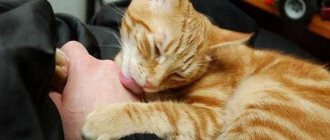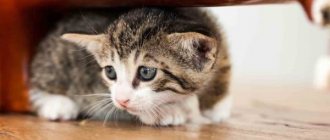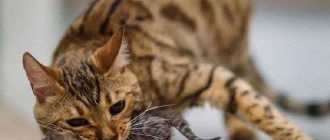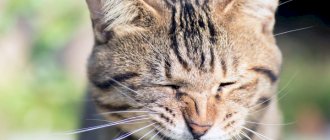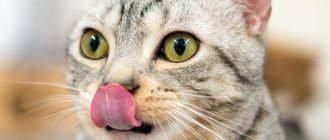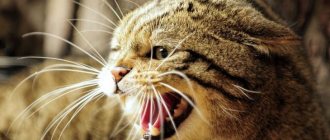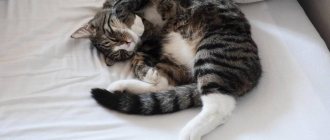my cat also often tries to wash me... as I understand it, she also considers me a cat, and cats often lick each other. ) like I’m her friend and mother and she doesn’t see the difference between me and herself. namely, my “I” is associated in animals with a person’s face and hands, so the cat takes care of its owner in this way))) like you can’t be related anymore))
Other answers
Actually, that's how she washes herself.
Source: Personal experience
no, it’s not a bad habit, it’s just her maternal care
This is a sign of submission and love. But you still need to wean off - worms, you see.
(Doctor Who) cats don't have faces, they have muzzles! Mine also licks. me =)) and also bites my nose. Well, if you look at how my cat does it, it looks like a request for attention. and naturally I start stroking him. in general, everything that he loves))))))))
Source: yayyyy
And my kitty also licks my face and hands and follows my heels. I think your cat loves you very much.
Maybe you just have a delicious mask on your face =) In general, this is how cats show their love. But it’s worth weaning off just to avoid catching a worm (even if you’re sitting at home) or an allergy (animal saliva most often becomes a powerful allergen, which causes allergies to both fur and secretions).
In general, a cat washes itself this way, but if it licks you, then this is a sign that it is grateful to you for something. Animals are very smart and loyal friends.
If she licks herself, then she washes herself, and if she licks you, then she says this: “Save the bastards, you are the mistress”))) you need to wean yourself off, otherwise you can pick up worms.
it means you need to wash
In general, this is gratitude and a manifestation of tenderness, it means he loves you)))) you shouldn’t wean him off, he might get offended. proud cats)
he washes his face
Source: I know it myself
I didn’t know that you could get worms from this... Very good useful information, but I really like it when cats lick me, however, mine don’t do this to me, they play around with themselves and each other!
Why do cats have a keen sense of smell?
Such a keen sense of smell is due to evolution. Kittens are born completely blind, and can only find their way to food by using their sense of smell. Further, cats, as natural predators, must be able to recognize whether they have come across fresh or stale meat, whether their relatives are sick, or whether it is dangerous to be indoors. There are hundreds of cases where cats warned unsuspecting owners about a gas leak or burning wiring.
The main sense of cats is their sense of smell.
While most people's primary sense is sight, cats' primary sense is smell, including that of humans. In fact, most cats identify their owners by smell, so it makes sense that most cats enjoy sniffing their owner's mouths since the owner's mouth will emit a strong, unique scent that their cat will associate with them.
Cats are believed to sniff their owner's mouths when they are comforted by the unique scent of their breath. So if you come home from work and find your cat climbing onto your lap and trying to smell your mouth and saliva, you should be flattered as your cat has obviously missed you and wants to feel comfortable being in your presence.
My cat comes up to my face at night and touches mine with her nose, what does this mean??
and my cat rubs her head against my nose - I know exactly what she wants! to wake.
Other answers
checks whether you are breathing or not
Kisses. Mine bites my lips.
maybe he kisses you before going to bed, like he says goodnight
Usually cats show love for their owners this way. it's the same as our kiss, only on the nose
He probably loves it! Does exactly the same to me when I pet her!
There is a superstition in America that cats steal human breath at night. nonsense, of course. She's probably trying to figure out how to come and sleep with you.
Wants to steal your soul. (as in the story by S. King). joke. Probably loves you
Performs routine bypass and monitoring of the condition of living beings belonging to her. Or, alternatively, it suggests the onset of a disease such as acute respiratory infections or migraines.
lack of affection0))
This is LUPOFFFF.
She just loves you!
this doesn't mean anything. checks you and your condition
In the morning, mine comes up and sniffs and waits for a reaction, which is typical in silence, without meowing. I noticed that she does this when I take a bath or shower with aromatic additives or aroma gel, etc. Maybe the body odor confuses her and she comes up to make sure who it is, because cats perceive their own smells, not external ones view.
The cat just walks around the apartment and sniffs everything. And it touches with its nose because cats have difficulty seeing anything closer than half a meter from its eyes. That is, the cat simply sniffs, but does not calculate the distance and pokes it accidentally.
About love and “good night” it’s beautiful, of course, but these are dreams. The cat doesn’t care much at all, she’s on her own, what a romance.
Just so you know, in cats, this approach of noses means greeting and friendly disposition. Cats that are poorly disposed towards each other do not “sniff”. Probably this gesture is an animal analogue of the English “How do you do”, a polite question that does not require a substantive answer. If your cat reaches out to you with its nose, it means it wants to say hello, express its affection for you and receive reciprocal affection and attention.
Cats that are poorly disposed towards each other do not “sniff”. Probably this gesture is an animal analogue of the English “How do you do”, a polite question that does not require a substantive answer. If your cat reaches out to you with its nose, it means it wants to say hello, express its affection for you and receive reciprocal affection and attention. We may well communicate with cats in their language, approach the cat’s nose with our own, on our own initiative, or rub our cheek against the cat’s fluffy cheek (after all, they do this to us?) I assure you, cats will perfectly understand our good intentions and correctly read the meaning of these movements. And they will be additionally pleased that you communicated with them in their language.
We may well communicate with cats in their language, approach the cat’s nose with our own, on our own initiative, or rub our cheek against the cat’s fluffy cheek (after all, they do this to us?) I assure you, cats will perfectly understand our good intentions and correctly read the meaning of these movements. And they will be additionally pleased that you communicated with them in their language.
Why does a cat sniff a person's nose?
According to some superstitions, a cat can tell by smell whether a person is sick or not. Thus, if a cat sniffs a person's nose, it can be assumed that it senses an impending cold or something similar. But this is not always the case, perhaps the owner of the animal recently kissed someone, or his nose was licked by a dog, or he simply ran his hand over his nose, with which he had previously touched something odorous. There can be a lot of options, and the cat, due to its curiosity, tries to understand what it smells like.
Cats can smell what their owners ate
Another reason many cats love to sniff human mouths is that cats can actually smell human saliva and can pinpoint what they've eaten in the last couple of hours. If your cat is a mouth sniffer, there is a high chance that she will try to sniff the mouth of anyone in your home to see if they have eaten any food recently.
© shutterstock
If your cat then learns that the person they are sniffing has eaten one of their favorite foods, your cat may try to befriend that person in hopes that they might have more of the food they recently ate to share with the hungry cat.
Why does a cat sniff a person’s nose: oddities of cat behavior
Cats are amazing pets. Often they can behave so strangely that people wonder: are these animals from this planet? For example, why do cats sniff a person’s nose, rub their hands and do other strange things?
What other strange behavior do cats have?
Sometimes furry pets rub the side of their muzzle against a person’s palm. This is due to the fact that they are trying to “stake out” this person for themselves, leaving their scent on him. In this way, they make it clear to other cats and animals that the person is busy and there is no point in meddling with him.
Sometimes cats may lick their owner's hair or skin. This indicates an extreme degree of affection, because the pet, by licking the other, shows its care.
Owners of mustachioed cats often notice another oddity - cats “bury” various things, even a cup of their morning coffee. In this way, animals make it clear that they do not like what they are burying.
The cat is trying to understand your general health
Some veterinarians believe that cats are trying to smell human mouths because human saliva smells different than cats do when people are healthy versus when people have a cold. Such veterinarians put forward the idea that when a cat sniffs its owner's mouth, they are actually trying to see whether the owner is healthy or sick.
For example, if your cat sniffs your mouth and senses that you have a cold, she may try to bring you a small gift, such as a half-dead mouse or bird, to increase your strength. After all, your cat may believe that by feeding you, you will get better faster.
Why do cats have a keen sense of smell?
Why does a cat lie on a person?
Such a keen sense of smell is due to evolution. Kittens are born completely blind, and can only find their way to food by using their sense of smell. Further, cats, as natural predators, must be able to recognize whether they have come across fresh or stale meat, whether their relatives are sick, or whether it is dangerous to be indoors. There are hundreds of cases where cats warned unsuspecting owners about a gas leak or burning wiring.
The smell of a cat's owner's sweat is perceived as a guarantee of protection.
A pet ends up in a person’s home, usually as a small kitten. Of course, the new environment becomes stressful for him. Everything around is new, everything is scary. And the owner is the only thing you can rely on - he will protect and feed. Therefore, the owner’s smell is associated with positivity and calm.
Naturally, the cat will choose the most “fragrant” places, and sweat concentrates where the sweat glands are located. Moreover, cats like the natural smell of sweat, without soap, deodorants and other chemicals. That is why, the stronger the smell of sweat from a person or from clothing, the more the cat likes it.
Cats regard the smell of their owner's sweat as the sweetest aroma in their lives. They prefer the sweat of a man, because it contains a certain emphasis that indicates the male and his strength. Of all the whiskers, cats are the ones that are most attracted to the smell of their owner's sweat. And if the cat is pregnant, then she will be incredibly happy just to have her owner return home.
Cats greet each other by sniffing their butts
Butt sniffing is a socially acceptable and healthy form of communication between cats. The smell of a cat's butt can provide a lot of information.
The cat's rectum contains the anal glands. These are two small sacs, through two holes that release an unpleasant-smelling substance into the rectum. A cat's anal glands empty each time her rectal sphincter contracts during bowel movements.
However, it can be difficult for owners to detect the odor of the anal glands because the odor is overwhelmed by the smell of your cat's feces. Cats have a more acute sense of smell and can therefore tell them apart.
Why do cats sniff butts?
Even though the butt greeting rituals are weird, felines have a purpose. A cat gets enough information from the smell of another cat's butt to tell whether it is friend or foe, a good companion or a nuisance. Is the new cat young and a threat to the other cat's territory?
Each cat has its own unique butt smell. This smell serves as identification of the cat. Butt sniffing helps cats determine if they've met before.
This helps establish dominance between the two cats. A cat that starts sniffing ass is often the dominant cat. A dominant cat will stop sniffing and become aggressive by hissing to complete the introduction.
Keep in mind that not all cats greet the same way. Some cats are shy and limit the amount of information they provide. So they sit down, cover their rectum with their tail, and limit the scent they emit.
What organs are responsible for the sense of smell in cats?
Dogs have the most delicate sense of smell, but this does not mean that our mustachioed pets are much inferior to them. In fact, the capabilities of these animals are approximately at the same level, but it is not entirely correct to compare them due to differences in physiology.
A little physiology
A neat cat's nose is just the outer shell. All the most interesting things are hidden inside:
- immediately behind the nostrils, long nasal passages and cavities open, purifying the inhaled air from bacteria and dust;
- in the back of the nasal passage is the olfactory epithelium, which is responsible for the perception of smell, the secretion of protective mucus and the formation of sensory neurons.
The developed circulatory system of the nose is directly connected to the brain. All incoming information is transmitted between these organs through neurons.
No less interesting is the direct imprint of the nose. It is unique for each cat, so it can easily be classified as biometric data.
Why are cats' sense of smell so strong?
The sense of smell of mustachioed pets is very different from ours. Their nasal epithelium contains as many as 80 million olfactory receptors, which is 8 times more than the average person.
The olfactory function works already from birth, which distinguishes it from hearing and vision. It is with its help that newborn kittens find their mother's nipple.
Fragrant traces
Whether it's a person, a cat bed, or a cardboard box, if a cat rubs against it, it's claiming ownership. Cats leave behind scents when they rub against objects. That's why cats sniff everything. If a cat smells another cat on an object, it will know that it is in the other cat's territory.
Scent mapping also helps cats navigate. Scenting objects around the house helps cats understand where they are and how to move around. If you have a cat that goes outside, she will use her scent map to find her way home.
Article Author: Richard Parker I'm Richard, I have experience in all matters related to feline health, behavior, grooming techniques and general pet care. Richard graduated with a degree in journalism in 2008. He is the proud owner of 5 adult cats (all adopted stray breeds), including an older cat who is now 20 years old.
Cats are forward-thinking
Cats have difficulty seeing objects near them. Instead of using sight, they rely on their sense of smell and touch to determine what is nearby. You may have noticed this when your cat cautiously approaches a new object.
Not only does a new object, person, or cat appear large and blurry to the cat when they are nearby, but their scent is also unfamiliar. Consequently, it either flees the scene or sniffs around until it detects an unfamiliar object or is safe.
How does the process of smell recognition occur?
When inhaled, air flows into the sinuses. The odors contained in it are deposited in the mucous secretion on the olfactory epithelium and, with the help of nerve endings, are transmitted directly to the cerebral cortex, where they are interpreted.
The human sense of smell operates in a similar way, so differences in this process are of greater interest. The cat's body is able to recognize certain odorous substances when they are injected directly into the blood, as well as through the Jacobson's organ, which is present in humans as a rudiment.
How to smell a cat correctly
If the cat is domestic, then you can sniff it. But you shouldn’t torture an animal if it wants privacy - it’s better to choose a better time for sniffing. Ideally, the cat should come on its own. If this happens, pet her and sniff her in between. Do this carefully so as not to scare the animal. After this, be sure to wash your face and hands with soap.
Most often, cats are distrustful of strangers, so before sniffing an animal, you first need to get to know it.
Residents of China sniff cats with pleasure, preferring them to children. Moreover, this is done not only by single young men, but also by married couples who do not have children. However, cat sniffing can cause some diseases. To avoid infection, the owner of the animal must observe basic hygiene measures.
What else is attractive about sweat for cats?
- It's all about pheromones (ancient Greek φέρω - I carry + ὁρμάω - I excite, encourage). Pheromones are chemical compounds of natural origin that play almost the main role in the interaction of animals of the same species. The power of pheromones over our smaller brothers is powerful, since they are responsible for reactions that ensure the survival of the species: reproduction, caring for offspring, etc. In particular, only pheromones allow the males and females of all animals that reproduce sexually to identify each other and mate.
- Salty sweat . Cats are partial to salty foods, and sweat, as you know, is an aqueous solution of salts and organic substances secreted by the sweat glands. Sweat plays a significant role in the socio-biological processes of information transfer between mammals. In addition to pheromones, a large number of biologically active substances are also transferred with sweat. By the way, human sweat emits a specific smell. It can be both unpleasant and magnetic, depending on the gender of the subject and his readiness to mate. However, fresh sweat has no odor. It begins to be felt after some time, when bacteria activate reproduction on the skin.
- New range of scents . As soon as the owner enters the house, the cat begins to explore his feet and shoes. After all, they contain so much information from the places he visited! These are unknown and endlessly entertaining smells, especially for those cats for whom access to the street is prohibited. They rub, as if securing their rights to objects, enveloping them with their smell. Cats learn and remember smell thanks to scent glands located on their faces.
- “Tame” the smell .
The lucky ones who can freely walk in the fresh air on their own, when returning home, try to replace the foreign smell with their own, family, or rather the owner’s, and that’s why they rub against people’s things. However, this does not apply to all cats. One fourth of the cat family is completely indifferent to the smell of human sweat, valerian or catnip. Maybe because their sense of smell is less developed? Smells also do not affect small kittens. A new scent is another reason for them to have fun.
The smell stimulates the cat's appetite
Cats have fewer taste buds and more smell receptors than humans. It is therefore obvious that a cat will use its sense of smell to gather information about the taste, aroma and safety of its food.
Your cat's favorite food, such as a bowl of his favorite wet food, awakens hunger thanks to its unique smell.
The downside to this is that cats with nasal congestion or respiratory infections may stop eating. If a cat can't smell food, it won't have an appetite. It causes anorexia in cats, which can lead to further complications if not treated promptly.
Cats communicate using scent
Cats do not express their feelings in words, do not hug or shake hands, but evaluate each other. When cats meet, they often sniff each other first. Some may exchange a slight headbutt. When a cat rubs its head against another cat, it releases pheromones from glands on its face.
The pheromones released during this exchange will reveal a lot about both cats. So, instead of using their voice, cats use smell and scent as a tool to communicate.
The main compounds used for chemical bonding between cats are called amines and acids. Amines and acids produce aromas that only cats can smell. These smells can tell a cat about another cat's mood and even what she likes to eat.
A cat can tell whether another cat is calm or aggressive, male or female, healthy or sick, weak or strong. A quick sniff of the head gives the cat some information about friend or foe. However, stronger scents are required to obtain detailed information, so they sniff each other's butts.
© shutterstock

